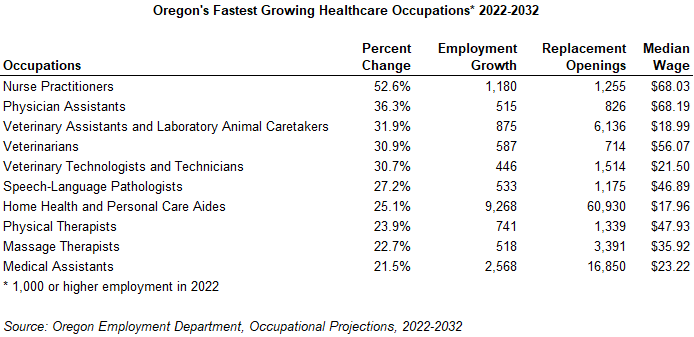Health Care Jobs Now and Into the Future
March 6, 2024Many industries in the nation are seeing an upward trend in employment as the economic landscape strengthens. According to the Bureau of Labor Statistics, six out of the 10 fastest-growing industries in the nation from 2022 to 2032 are in the health care and social assistance sectors. These industry groups include individual and family services, home health care services, hospitals, outpatient care centers, offices of physicians, and offices of other health practitioners.
The major factors contributing to the projected increase of health care and social assistance jobs include:
- Increased demand for care as the population ages
- Longer life expectancies
- Growth in the number of people with chronic health conditions
Oregon’s Health Care Industry Projected to Grow
Oregon’s industry projections anticipate that the health care and social assistance industry will grow 17% between 2022 and 2032, adding 44,500 new jobs – faster than the 11% growth rate for all industries.
Occupational Projections Expect Many Openings
Many of the fastest growing occupations are in health care as new technology emerges and demand for services grows. The Oregon Employment Department estimates health care occupations will grow by 16.8%, adding 32,890 new jobs in the next decade. Over this period, replacement openings for health care workers who retire or move into other occupations is expected to be six times as high, at 197,326 jobs.

Health Care Jobs of the Future
Health care is a rapidly changing industry, consistently on the cutting edge of new technology, new research, and rapid innovation. Technology and demand for services is transforming the industry. Health care will continue to incorporate many new technologies like expanded electronic records, robotic surgeries, and prosthetics you can move with your mind.
One medical advancement that is gaining momentum is telemedicine. This advancement is a tool to provide virtual care to underserved areas and places where demand for specialists is especially high. Telemedicine can also be used to monitor patients with chronic illnesses and save lives. An urgent care provider in California, EveryDay Healthcare, explains the benefits and challenges of telemedicine and how it is reshaping the health care landscape.
With health care constantly evolving, many jobs in health care did not exist just a few years ago and a number of new occupations are currently being created. Here is a selection of six health care jobs that may in high demand in the near future according to Forbes, a global media company.
Reconstructive Surgery 3D Printing Specialist
Medical professionals are beginning to use 3D printing to improve their practice and offer more customized health care options for their patients. The future of the health care industry will require design engineers and specialists who can create 3D reconstructive molds and models. There will be high demand for health care professionals who can maintain and upkeep all of the equipment.
Virtual Hospital Manager
The nation is seeing a rise of virtual hospitals where a hospital facility has a number of staff on board but no beds. An example is Mercy Virtual, which is the world’s first hospital facility dedicated entirely to telehealth. This hospital is a 125,000-square-foot facility with 330 staff members and all patients are managed virtually via telehealth-based approaches. In the future, similar facilities will need dedicated managers who are well versed in electronic transmission, ethics, and other aspects associated with delivering health care virtually.
Precision Medicine Compounding Pharmacist
In the near future, patients could be treated with precision medicine based on their individual characteristics. This could make bulk pharmaceutical drugs eventually obsolete. Compounding pharmacists will oversee robots that take care of the process by providing them with the right information about the patient’s genetics and individual characteristics defined by medical imaging and analytics.
Epigenetic Counselors
Epigenetics is the study of how a person’s behavior and environment can cause changes that affect the way a person’s genes work. As our understanding of this linkage improves, epigenetic counselors will educate adults and the younger generation to make the right choices to ensure healthier lives.
Robotic Clinical Documentation Scribes
Documenting patient’s clinical records requires doctors spending significant time with paperwork instead of patient care. Voice recognition, natural language processing and artificial intelligence will automate record keeping in the future but will still require a human “scribe” to ensure all documentation is thorough and accurate.
Voice Assistant Healthcare Content Specialist
Voice-based virtual assistants will support home care for seniors aging in place and chronic disease management. As a relatively new technology, many applications for virtual healthcare will likely evolve in the future.
What It All Means
Over the next 50 years, health care across the world is expected to change, including an increased use of AI and robotics. In the medium term, 10 to 30 years, an improvement of data-informed personalization in healthcare is expected. This type of medicine uses a patient’s own personal data to prevent, diagnose, and treat diseases.
Over the next few decades, innovations like telemedicine and virtual reality will vastly improve the health care experience for patients and providers. With all the progress made in health innovation these days – advances in surgical robotics, virtual reality therapies and diagnostic tools – it is easy to picture the hospital of 2050 as a place where exam rooms look like a scene from the Jetsons, artificial intelligence aides human practitioners, and every instrument connects to the cloud. New occupations in health care will surely need to be created to respond to evolving health care services.